-
01-01-2016
ERRATUM
Revista Brasileira de Enfermagem. 2016;69(5):1002-1002
Abstract
ERRATUM
Revista Brasileira de Enfermagem. 2016;69(5):1002-1002
DOI 10.1590/0034-7167.20166905e01
Views0Article “Alcohol and alcoholism: attitudes of nursing students”, with number of DOI: http://dx.doi.org/10.1590/S0034-71672013000100013, published in the journal Revista Brasileira de Enfermagem, v66(1):84-9, page 89 that read: “18. Miranda SP, Vargas D. Satisfação de pacientes de um centro de atenção Psicossocial álcool e drogas com o atendimento do enfermeiro. SMAD, Rev Eletrônica Saúde Mental Alcool Drog […]See more -
01-01-2016
Research methodology for nursing and health: a book review
Revista Brasileira de Enfermagem. 2016;69(5):1000-1001
Abstract
Research methodology for nursing and health: a book review
Revista Brasileira de Enfermagem. 2016;69(5):1000-1001
DOI 10.1590/0034-7167-2015-0135
Views1For those interested in nursing and health, the book entitled “Research methodology for nursing and health: from theory to practice”() was released in October 2015, at the 67th Brazilian Congress of Nursing, sponsored by National ABEn. The interest emerged from two organizers: Dr. Maria Ribeiro Lacerda (UFPR) and Dr. Regina Gema Santini Costerano (UNIFRA). Forty-seven […]See more -
01-01-2016
Violence in the workplace in Nursing: consequences overview
Revista Brasileira de Enfermagem. 2016;69(5):996-999
Abstract
Violence in the workplace in Nursing: consequences overview
Revista Brasileira de Enfermagem. 2016;69(5):996-999
DOI 10.1590/0034-7167-2015-0133
Views0See moreABSTRACT
Objective:
to reflect on the consequences of workplace violence experienced by nursing professionals.
Methods:
this is a reflection paper based on recent publications related to the subject, particularly researches carried out in Brazil and in other countries.
Results:
exposure to workplace violence has been associated with health problems in nursing professionals, which may be physical damage, emotional manifestations, and psychic disorders. It also affects the employee performance, his or her family and social interactions.
Conclusion:
this phenomenon is potentially noxious and costly, for it leads to suffering, illness, absence from work, and even death. This reflection calls attention moreover to the importance of a safe and adequate health care work environment.
-
REFLECTION01-01-2016
Construcción de la enfermera de práctica avanzada en Catalunya (España)
Revista Brasileira de Enfermagem. 2016;69(5):991-995
Abstract
REFLECTIONConstrucción de la enfermera de práctica avanzada en Catalunya (España)
Revista Brasileira de Enfermagem. 2016;69(5):991-995
DOI 10.1590/0034-7167.2016690507
Views0RESUMEN
El desarrollo de la enfermera de práctica avanzada (EPA) ha supuesto un reto para las enfermeras en países como EE.UU., Canadá, Gran Bretaña y Australia, entre otros, y desde hace escasos años está siendo considerada en Catalunya y España como un sistema para desarrollar nuevos roles que aporten eficacia y eficiencia al sistema sanitario. El presente artículo pretende conceptualizar la EPA y los modelos de referencia así como contextualizar y reflexionar sobre la EPA en Catalunya, desde el punto de vista de formación y de la implantación de los denominados nuevos roles de enfermería, asimilándolos a la práctica avanzada.
Keywords:Competencia ClínicaEnfermeríaEnfermería de Práctica AvanzadaPráctica ProfesionalRol de la EnfermeraSee more -
01-01-2016
Developing the Advanced Practice Nurse in Catalonia
Revista Brasileira de Enfermagem. 2016;69(5):991-995
Abstract
Developing the Advanced Practice Nurse in Catalonia
Revista Brasileira de Enfermagem. 2016;69(5):991-995
DOI 10.1590/0034-7167.2016690507
Views0See moreABSTRACT
The development of advanced practice nurses (APN) has proved a challenge for nurses in countries such as the USA, Canada, Great Britain, and Australia among others. It is only in recent years that the system has been considered in Catalonia and Spain as a way to develop new roles to bring effectiveness and efficiency to the health system. From the standpoint of training and implementation of the above-mentioned new nursing roles, the following article aims to conceptualise APN and its reference models, as well as to contextualise and reflect on APN in Catalonia in order to assimilate them into advanced practice.
-
01-01-2016
International academic mobility in nursing education: an experience report
Revista Brasileira de Enfermagem. 2016;69(5):986-990
Abstract
International academic mobility in nursing education: an experience report
Revista Brasileira de Enfermagem. 2016;69(5):986-990
DOI 10.1590/0034-7167-2015-0128
Views0See moreABSTRACT
Objective:
report the experience of international academic mobility in Ireland through the program Science Without Borders during undergraduate education in nursing.
Method:
a report of experience presented in chronological order, with a descriptive nature.
Results:
the opportunity to know and be able to discuss questions regarding health and nursing in Ireland allowed the review of concepts and a more reflective perspective regarding nursing practices. Additionally, the exchange promoted personal strengthening regarding the confrontation and solution of problems, development of technical and scientific abilities, improvement of linguistic competences and construction of personality, independence and maturity.
Conclusion:
regarding such constructive and enriching experience that this mobility provides to students, to the governing authorities, to the population and to Brazilian nursing, sharing this experience is expected to serve as encouragement for those who search for new horizons, with the objective of adding knowledge for their personal and professional life.
-
01-01-2016
Online training for health professionals in three regions of Brazil
Revista Brasileira de Enfermagem. 2016;69(5):981-985
Abstract
Online training for health professionals in three regions of Brazil
Revista Brasileira de Enfermagem. 2016;69(5):981-985
DOI 10.1590/0034-7167.2016690506
Views0See moreABSTRACT
Objective:
to describe online training experience aimed at professionals working in the public health service in 27 Neonatal and Pediatric Intensive Care Units, and to reflect concerning the training process and possible improvements in this process.
Method:
this is an experience report study about the online training with multidisciplinary content, planned from the situational diagnosis of 27 institutions. The training target set was 10 participants per institution and per module, including the following topics: Indicators of Quality as a Management Tool, Hand Hygiene, Patient Safety, Intravenous Therapy and Patients’ Chart Record.
Results:
a total of 2,071 active students in the modules, with 1,046 approved. The mean of 76 students per module exceeded the target set.
Conclusion:
experience has shown that online training is comprehensive as a potential tool for the professional technical development and digital inclusion. The online learning system becomes weakened if participants are unaware of the technological resources.
-
01-01-2016
Technologies in intensive care: causes of adverse events and implications to nursing
Revista Brasileira de Enfermagem. 2016;69(5):972-980
Abstract
Technologies in intensive care: causes of adverse events and implications to nursing
Revista Brasileira de Enfermagem. 2016;69(5):972-980
DOI 10.1590/0034-7167.2016690505
Views0See moreABSTRACT
Objective:
to identify the causes of adverse events affecting clients resulting from the use of equipment in intensive care services; to point out the main recommendations for clinical practice to minimize these events and, then, discuss the implications to nursing care.
Method:
integrative and descriptive review on the SciELO, Medline, LILACS, and PubMed databases. Articles were selected based on the inclusion criteria and the structured instrument was applied.
Results:
altogether, 11 articles were selected where three evidence units were outstanding: Equipment failure; inadequate use of equipment; and team failure. Permanent education of professionals; evaluation of production and availability of equipment; and use of checklists are recommended.
Conclusion:
preventing adverse events related to equipment is one of the nursing responsibilities and requires the establishment of defensive barriers to prevent these.
-
ORIGINAL ARTICLE02-26-2024
Technological prospecting of patents related to monitoring accidents due to falls in hospitals
Revista Brasileira de Enfermagem. 2024;77(1):e20230084
Abstract
ORIGINAL ARTICLETechnological prospecting of patents related to monitoring accidents due to falls in hospitals
Revista Brasileira de Enfermagem. 2024;77(1):e20230084
DOI 10.1590/0034-7167-2023-0084
Views0See moreABSTRACT
Objectives:
to map the production of technologies aimed at monitoring falls in a hospital environment protected by registered patents.
Methods:
a technological prospecting of international patents, with a quantitative approach, with search carried out between February and March 2022 in the Derwent Innovations Index database with descriptors fall, hospital, monitoring.
Results:
212 patents were found, with the majority filed and published since 2010, by Tran B (9) and Cerner Innovation Inc (9), focused on health technology. Universities were responsible for 13% of deposits. There was a predominance of records from the United States (43.4%), China (21.7%) and Japan (12.3%), in addition to technological strategies classified as devices for the environment (80.7%) and for preventing falls (66.5%) as well as trend towards resources with multiple functionalities in the same technology.
Conclusions:
the plurality of functions in the same device reflects the search for optimizing resources and the concern with comprehensive care.
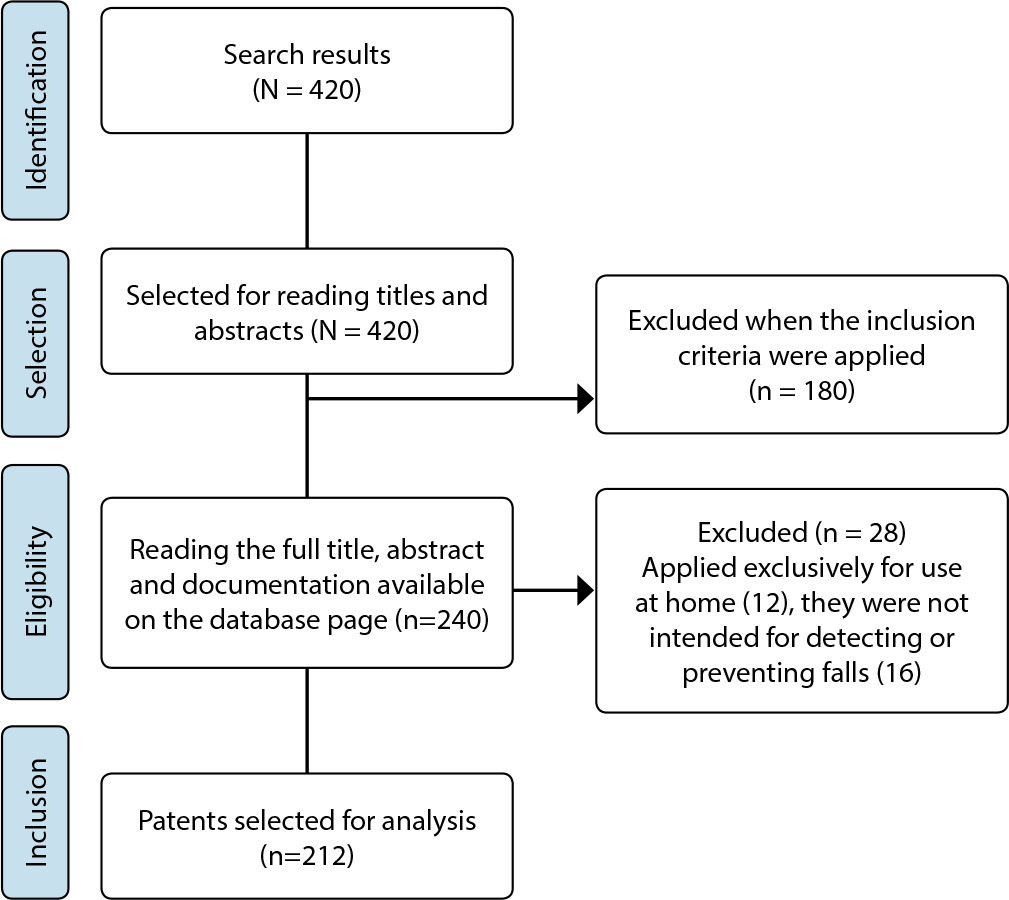
-
ERRATUM02-26-2024
ERRATUM
Revista Brasileira de Enfermagem. 2024;77(1):e20230045
Abstract
ERRATUMERRATUM
Revista Brasileira de Enfermagem. 2024;77(1):e20230045
DOI 10.1590/0034-7167.20247701e04
Views0In the article “Coping strategies for chronically ill children and adolescents facing the COVID-19 pandemic”, with DOI number: , published in Revista Brasileira de Enfermagem, 2023;76(Suppl 2):e20230045, in the author:Where it read:[…]See more -
ERRATUM02-26-2024
ERRATUM
Revista Brasileira de Enfermagem. 2024;77(1):e20160061
Abstract
ERRATUMERRATUM
Revista Brasileira de Enfermagem. 2024;77(1):e20160061
DOI 10.1590/0034-7167.20247701e03
Views0In the article “Nurses in the labor market: professional insertion, competencies and skills”, with DOI number: , published in Revista Brasileira de Enfermagem, 2017;70(6):1220-6, on page 1225:Include before REFERENCES:[…]See more -
ORIGINAL ARTICLE01-24-2019
Active teaching model to promote critical thinking
Revista Brasileira de Enfermagem. 2019;72(1):293-298
Abstract
ORIGINAL ARTICLEActive teaching model to promote critical thinking
Revista Brasileira de Enfermagem. 2019;72(1):293-298
DOI 10.1590/0034-7167-2018-0002
Views0See moreABSTRACT
Objective:
To present the experience of elaboration and implementation of the Active Teaching Model to Promote Critical Thinking (MEAPC), associated to Problem-Based Learning (PBL), for undergraduate students in Nursing.
Method:
Case report on the experience of the educational intervention (MEAPC + PBL) with undergraduate students in Nursing, in a 20-hour course on Basic Life Support (BLS). The MEAPC was validated by judges to guide the analysis of clinical cases. Critical Thinking (CT) skills were assessed using the California Critical Thinking Skills Test.
Result:
The educational intervention took place in two phases: elaboration and implementation, allowing not only the production of knowledge about BLS, but also the development of CT and exchange of experiences for teaching-learning.
Conclusion:
The association of the MEAPC to the PBL in the course of BLS organized the learning, gave opportunity to acquire knowledge and to stimulate the skills of the CT.
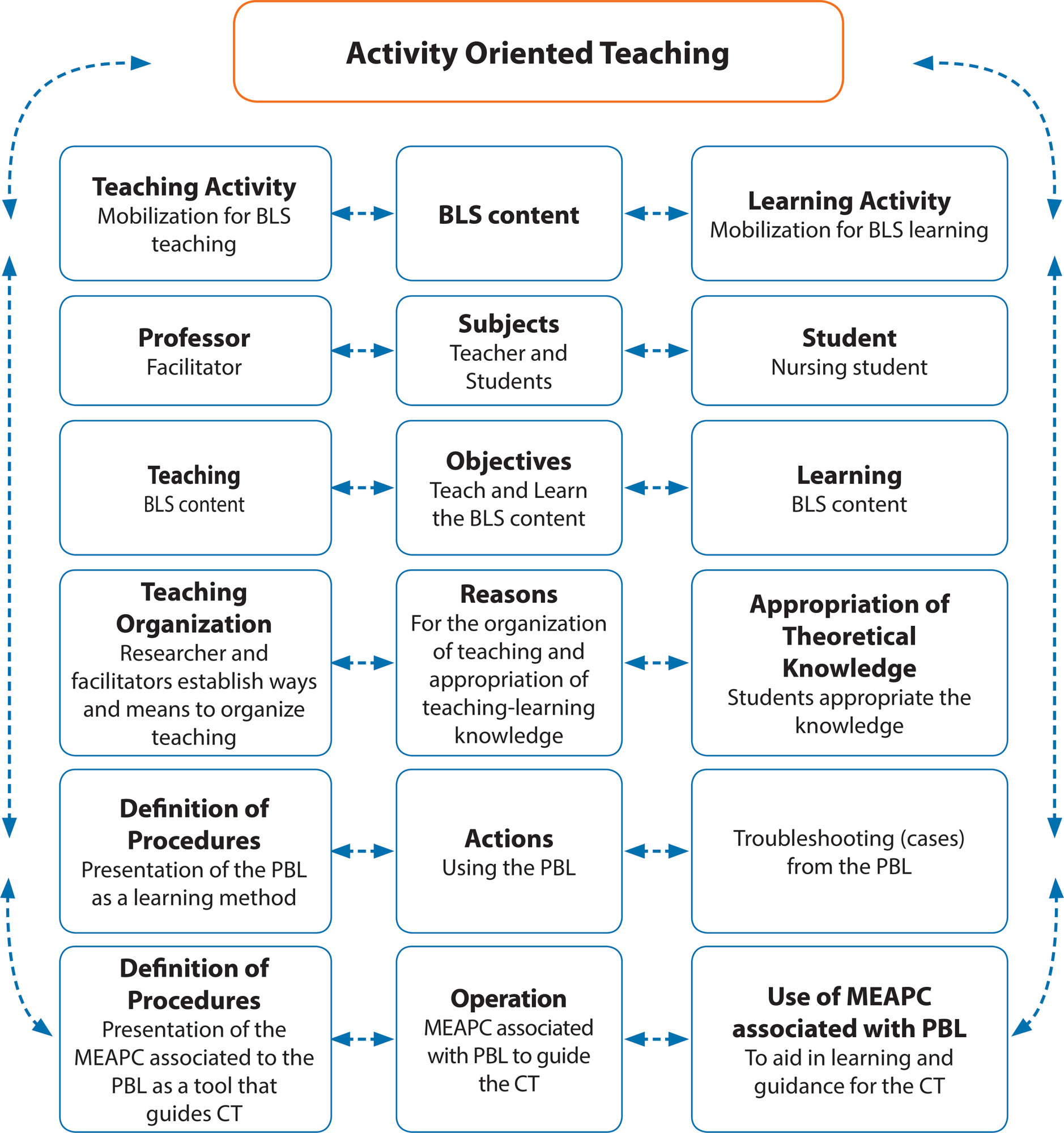
-
RESEARCH01-24-2017
Nurses in the labor market: professional insertion, competencies and skills
Revista Brasileira de Enfermagem. 2017;70(6):1220-1226
Abstract
RESEARCHNurses in the labor market: professional insertion, competencies and skills
Revista Brasileira de Enfermagem. 2017;70(6):1220-1226
DOI 10.1590/0034-7167-2016-0061
Views0See moreABSTRACT
Objective:
to characterize nurses graduated from the School of Nursing of the University of São Paulo, from 2006 to 2012; verify their entry, facilitating factors and difficulties of these graduates in the labor market and to consider their skills and competences in the world of work.
Method:
an exploratory, descriptive study with a qualitative approach.
Results:
out of 505 graduates, 172 (34.1%) participated in the research. Entry into the labor market was mainly via public hospital institutions, in the SE of Brazil, in the caregiving sectors. The greater part remained from one to two years in their first job. Most agreed that they were prepared to meet the health needs of the population. Furthermore, they had been encouraged to seek systematic and continuous improvement in a critical, reflexive and creative way, while combining technical-scientific knowledge and personal skills.
Conclusion:
the results show that the University of São Paulo has been preparing nurses for work in the labor market, in accordance with the provisions of the National Curricular Guidelines.
-
01-15-2024
ERRATA
Revista Brasileira de Enfermagem. 2024;77(1):e2024n1e01
Abstract
ERRATA
Revista Brasileira de Enfermagem. 2024;77(1):e2024n1e01
DOI 10.1590/0034-7167.20247701e01
Views0En el artículo “La ética del cuidado de enfermería para personas transgénero”, con número DOI: , publicado en la Revista Brasileira de Enfermagem, 2023;76( Suppl 3):e20220797, en autoría:Onde se lia:[…]See more -
ERRATUM01-15-2024
ERRATUM
Revista Brasileira de Enfermagem. 2024;77(1):e2024n1e01
Abstract
ERRATUMERRATUM
Revista Brasileira de Enfermagem. 2024;77(1):e2024n1e01
DOI 10.1590/0034-7167.20247701e01
Views1In the article “The ethics of nursing care for transgender people”, with DOI number: , published in Revista Brasileira de Enfermagem, 2023;76(Suppl 3):e20220797, in authorship:Where it read:[…]See more -
12-08-2024
Contexto ibero-americano da enfermagem: construindo e compartilhando conhecimento
Revista Brasileira de Enfermagem. 2024;77(1):e770101
Abstract
Contexto ibero-americano da enfermagem: construindo e compartilhando conhecimento
Revista Brasileira de Enfermagem. 2024;77(1):e770101
DOI 10.1590/0034-7167.2024770101pt
Views0Na próxima semana, acontecerão dois grandes eventos científicos em Madri e Granada (Espanha). Serão atividades internacionais, específicas e de forma muito especial, embora não exclusivas do campo ibero-americano, organizadas e desenvolvidas por duas sociedades científicas de enfermagem muito importantes, como a Associação de Enfermagem Comunitária (AEC) e a Associação Latino-Americana de Escolas e Faculdades de […]See more
-
01-01-2015
Low birth weight in a municipality in the southeast region of Brazil
Revista Brasileira de Enfermagem. 2015;68(6):1169-1175
Abstract
Low birth weight in a municipality in the southeast region of Brazil
Revista Brasileira de Enfermagem. 2015;68(6):1169-1175
DOI 10.1590/0034-7167.2015680624i
Views0See moreABSTRACT
Objective:
to identify the prevalence of low birth weight in the city of São Paulo.
Method:
epidemiological cross-sectional study with data collected by means of the Brazilian Live Birth Information System related to births occurred in the city of São Paulo between 2007 and 2013. Maternal, gestational, childbirth, and neonatal variables were analyzed descriptively and by association.
Results:
9.65% (1,342,655) of live births were underweight (mean of 3234.55 grams in the term group and 2312.17 in the pre-term group) with a mean maternal age of 27.53 years old. The risk factors identified include maternal age, not having a partner, low maternal level of education, other race rather than white, pre-term pregnancy, multiple births, low number of prenatal check-ups, and cesarean delivery.
Conclusion:
knowledge of this evidence favors planning the care provided by defining strategies to reduce it and consequently improve maternal and infant health care.

-
01-01-2015
Gait speed and cognitive score in elderly users of the primary care service
Revista Brasileira de Enfermagem. 2015;68(6):1163-1168
Abstract
Gait speed and cognitive score in elderly users of the primary care service
Revista Brasileira de Enfermagem. 2015;68(6):1163-1168
DOI 10.1590/0034-7167.2015680623i
Views0See moreABSTRACT
Objective:
to investigate the association between gait speed and the cognitive score of elderly patients enrolled in a Basic Health Unit.
Method:
a quantitative cross-sectional study with 203 elderly, a sample calculated based on the estimated population proportion. Data were collected using a sociodemographic and clinical questionnaire, gait speed test (GS) and the Mini Mental State Examination (MMSE).
Results:
the illiterate patients had a mean MMSE=19.33(±3.7) and GS = 0.76m/s (±0.3); those with low/medium education had a MMSE = 25.43(±2.8) and GS = 0.92m/s (±0.2); and the elderly with higher education had a MMSE = 27.33(±2.9) and GS=1.12m/s (±0.3).There was a weak correlation (R2=00354) between gait speed and cognitive score, with statistical significance (Prob>F = 0.0072) and a positive linear trend.
Conclusion:
the better cognitive score the higher the gait speed; the illiterate elderly were those with lower gait speed, thereby indicating a poorer physical performance.
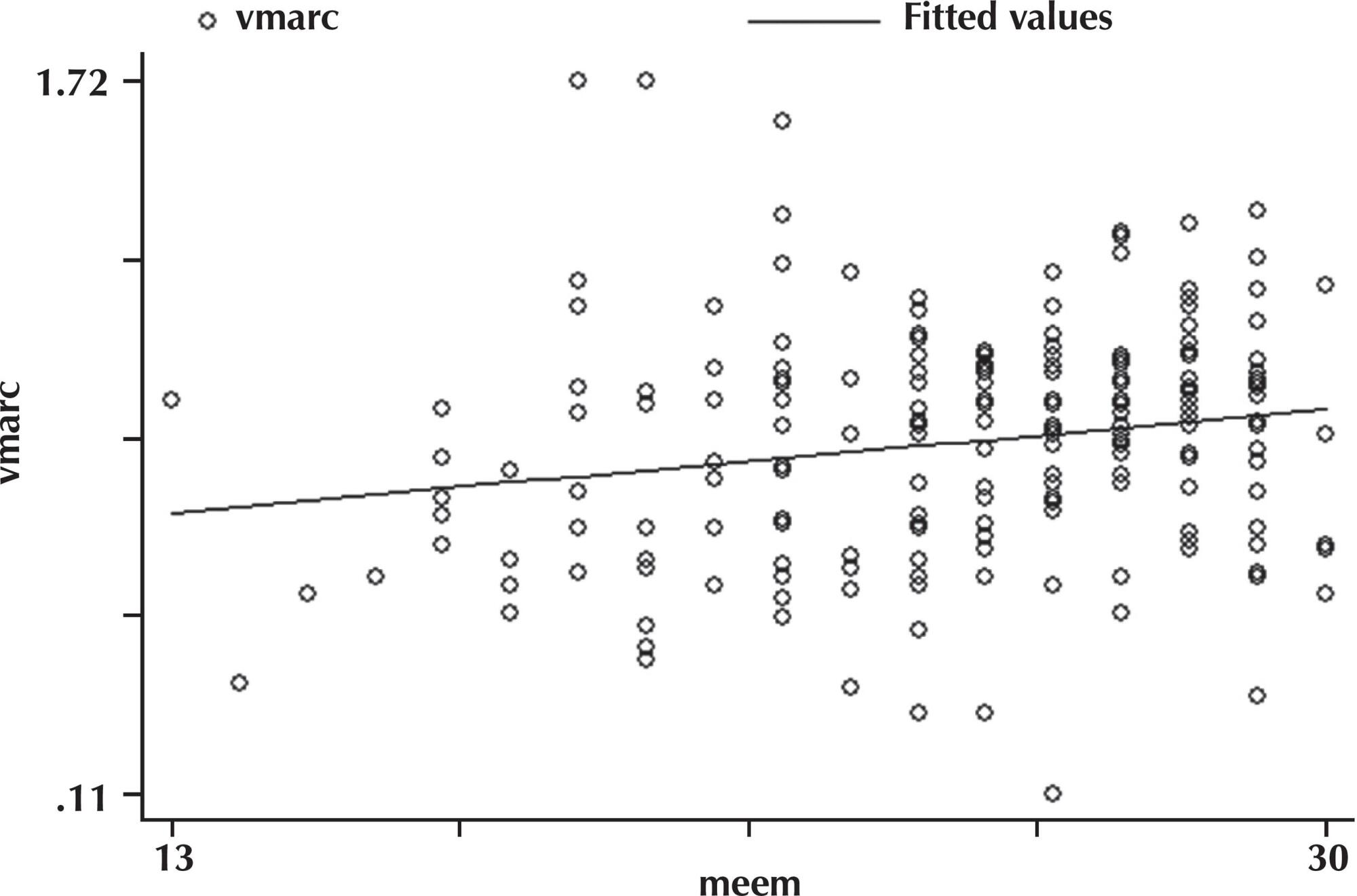
-
01-01-2015
Fluid and dietary restriction’s efficacy on chronic kidney disease patients in hemodialysis
Revista Brasileira de Enfermagem. 2015;68(6):1154-1162
Abstract
Fluid and dietary restriction’s efficacy on chronic kidney disease patients in hemodialysis
Revista Brasileira de Enfermagem. 2015;68(6):1154-1162
DOI 10.1590/0034-7167.2015680622i
Views0See moreABSTRACT
Objective:
to identify self-care measures to manage fluid and dietary restrictions and assess their effectiveness.
Method:
descriptive-correlational study and cluster analysis with 254 chronic renal failure patients on regular hemodialysis program, handled by hemodiafiltration. We evaluated the effectiveness of self-care by interdialytic weight gain (IWG) and by potassium and phosphorus serum pre-dialysis serum levels.
Results:
several self-care measures were significantly correlated with a lower IWG and a lower level of pre-dialysis phosphorus. Patients most often use measures to reduce salt consumption than measures to restrict potassium and dietary phosphorus. The spouse provides important support dietary management. Subjects who use more often the self-care measure are mostly female, are older, less IWG and have a higher Kt/V.
Conclusion:
these results can contribute to the nursing educational support.
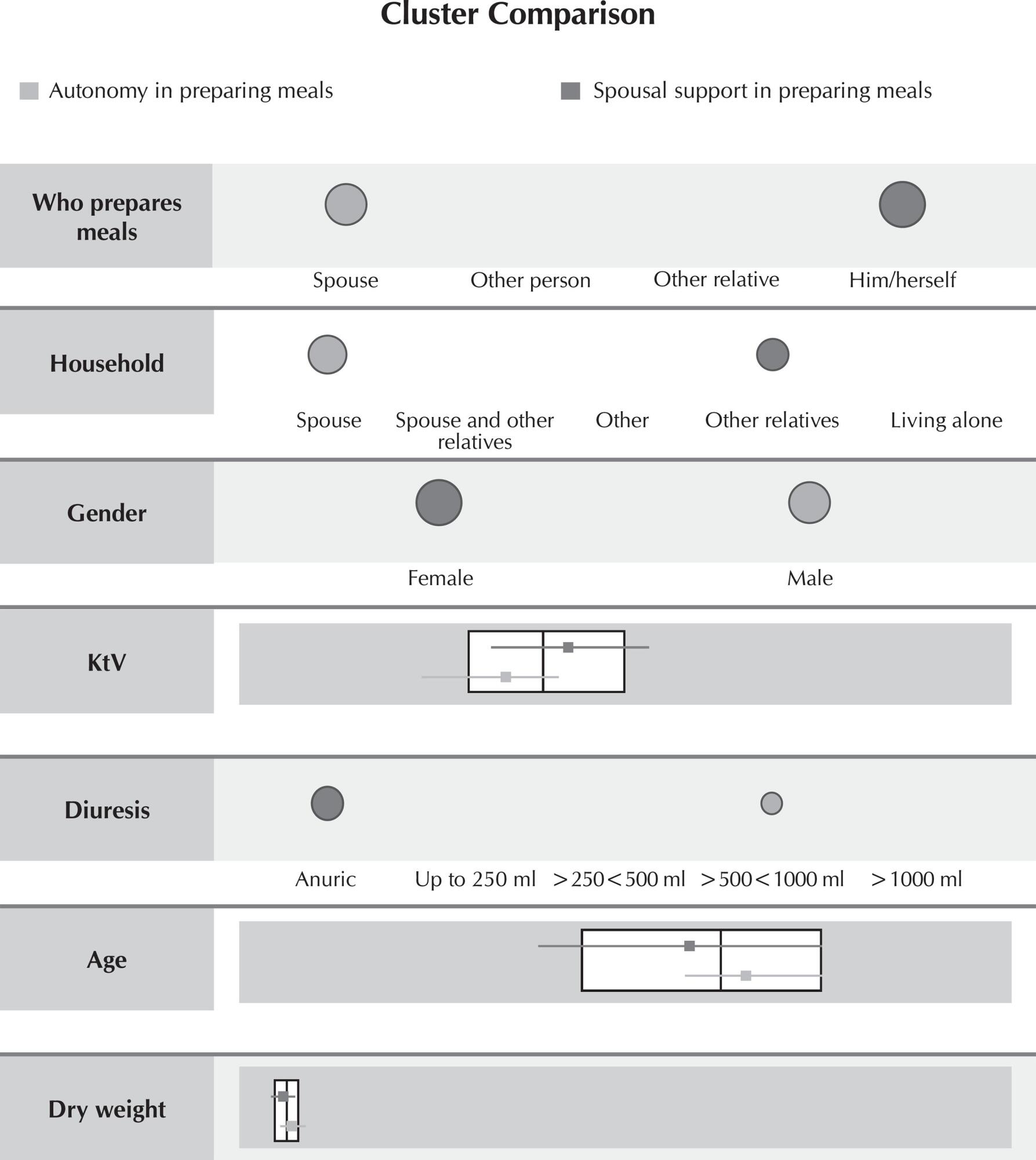
-
01-01-2015
Validation of newborn positioning protocol in Intensive Care Unit
Revista Brasileira de Enfermagem. 2015;68(6):1147-1153
Abstract
Validation of newborn positioning protocol in Intensive Care Unit
Revista Brasileira de Enfermagem. 2015;68(6):1147-1153
DOI 10.1590/0034-7167.2015680621i
Views0See moreRESEARCH
Objective:
to verify the positioning indications of newborn sand build a standard operating procedure protocol for newborn positioning in Neonatal Intensive Care Unit (NICU).
Method:
for protocol validation, the Delphi technique was used ,in which expert nurses in the field reviewed the proposed procedure.
Results:
we present the results of this validation in a protocol form, to contribute to the discussion about newborn positioning in NICU and standardization of nursing care related to positioning. We evaluated ten indicators, in which there was agreementof100.0% in seven, and of80% in three, above the 60% recommended by the validation technique.
Conclusion:
given the importance of newborn positioning in NICU for its neuromuscular development, this study contributes to the adoption of an evidence-based practice for nursing.
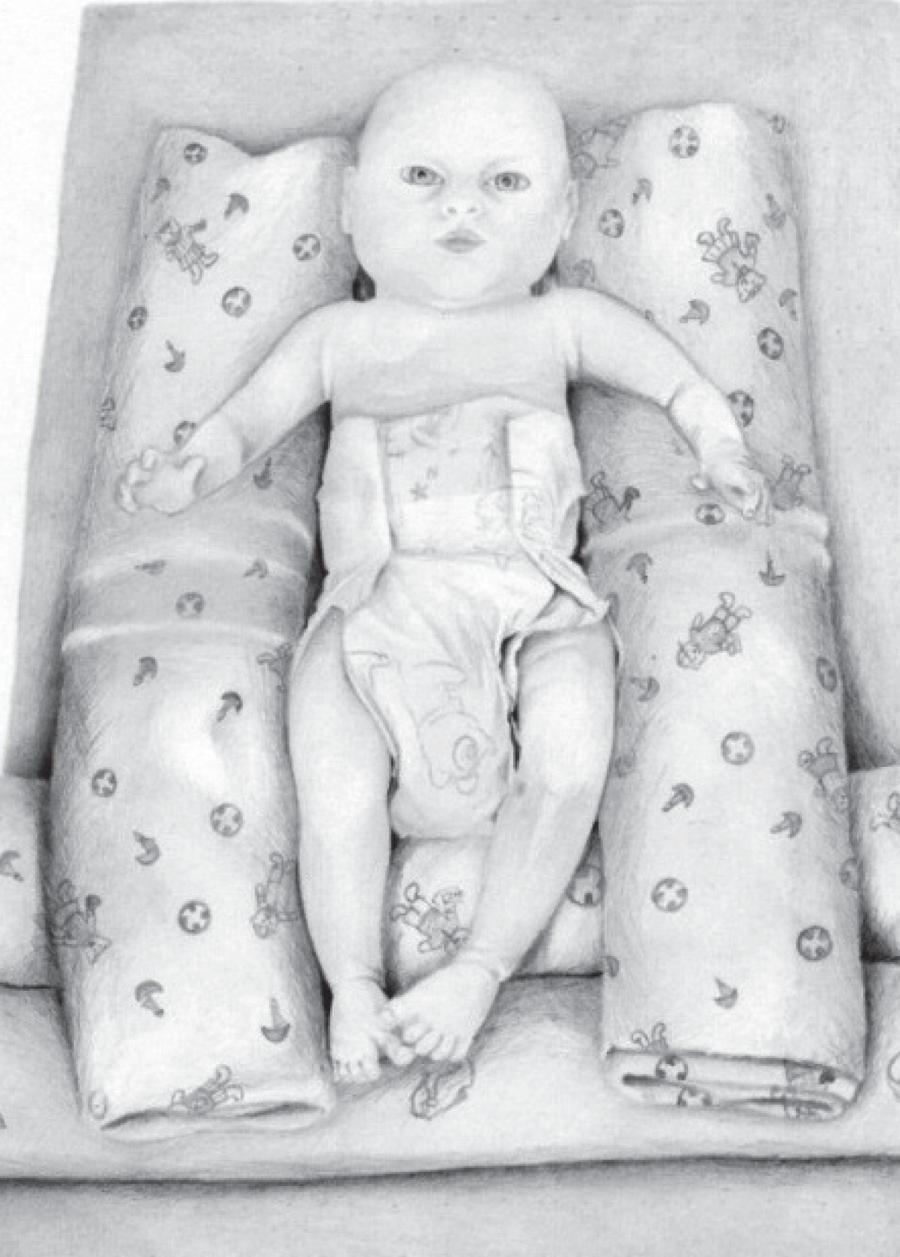
-
01-01-2015
Patient safety culture in a bone marrow transplantation unit
Revista Brasileira de Enfermagem. 2015;68(6):1139-1146
Abstract
Patient safety culture in a bone marrow transplantation unit
Revista Brasileira de Enfermagem. 2015;68(6):1139-1146
DOI 10.1590/0034-7167.2015680620i
Views0See moreABSTRACT
Objective:
evaluate the patient safety culture in the perspective of health professionals from a bone marrow transplantation unit of an oncology research center, at a reference hospital for cancer treatment in Santa Catarina, Brazil.
Method:
a quantitative cross-sectional study that used the Safety Attitudes Questionnaire was conducted between August and September 2013. The study analyzed 33 professional surveys. Statistical data analysis used descriptive and inferential statistics.
Results:
among the dimensions analyzed, only “job satisfaction” reached a mean score above 75, considered positive in terms of patient safety culture.
Conclusion:
the dimensions of safety culture present in the survey have to be valued by professionals and managers to allow safe patient care.
-
01-01-2015
Job satisfaction of nursing staff in a university hospital
Revista Brasileira de Enfermagem. 2015;68(6):1130-1138
Abstract
Job satisfaction of nursing staff in a university hospital
Revista Brasileira de Enfermagem. 2015;68(6):1130-1138
DOI 10.1590/0034-7167.2015680619i
Views0See moreABSTRACT
Objective:
identify the determinants of job satisfaction of the nursing staff of a public university hospital.
Method:
secondary study with mixed data approach and simple and multiple linear regression. A total of 115 subjects participated in the study, 41 nurses and 74 nursing assistants and technicians. The data collection occurred in 2013 using the QST-Caism questionnaire.
Results:
education, hierarchical level and workplace constitute job satisfaction determinants. However, age, gender, job and work period did not show this relationship. More educated workers held low job satisfaction if exercised not graduated nursing functions.
Conclusion:
graduated workers who perform high school functions are more unsatisfied than those who have high school function and qualification.
-
01-01-2015
Medical waste in mobile prehospital care
Revista Brasileira de Enfermagem. 2015;68(6):1122-1129
Abstract
Medical waste in mobile prehospital care
Revista Brasileira de Enfermagem. 2015;68(6):1122-1129
DOI 10.1590/0034-7167.2015680618i
Views0See moreABSTRACT
Objective:
the objective of this study is to identify how Medical Waste (MW) is managed in Mobile Prehospital Care (MPC) services in the state of São Paulo as well as characterize and quantify this waste.
Method:
exploratory and descriptive field study with data collection based on the methodology proposed by the Pan American Health Organization (PAHO), which was conducted over eight consecutive days to identify the production and characteristics of generated waste.
Results:
it was found that the MW management of the MPC is not yet in line with the requirements of RDC 306/04, which could affect the occupational safety of workers, patients, the community, and the environment.
Conclusion:
it is recommended for the health managers to focus on this issue. The lack of studies with regard to MPC also indicates the need for further studies on the waste management.

-
01-01-2015
Severe lactational mastitis: particularities from admission
Revista Brasileira de Enfermagem. 2015;68(6):1116-1121
Abstract
Severe lactational mastitis: particularities from admission
Revista Brasileira de Enfermagem. 2015;68(6):1116-1121
DOI 10.1590/0034-7167.2015680617i
Views0See moreABSTRACT
Objective:
to identify characteristics of women who have suffered severe lactational mastitis.
Method:
a descriptive, retrospective, documentary, quantitative study was performed. Data were collected from patient records of 114 hospitalized women from January of 2009 to December of 2013. Data were analyzed by using descriptive statistics.
Results:
a higher percentage of severe lactational mastitis was found in young, primiparous women who had completed high school, who had no partner, and did not have a job; 96.5% of women had breast complications before admission and remained hospitalized an average of 4.4 days; at discharge, 23.7% of women had weaned their infants.
Conclusion:
this study showed that severe lactational mastitis can cause great harm to the woman and the baby.
Search
Search in:
Nuvem de Tags
Adolescente (85) Atenção Primária à Saúde (239) COVID-19 (91) Criança (91) Cuidados de Enfermagem (269) Educação em Enfermagem (151) Educação em Saúde (139) Enfermagem (930) Enfermagem Pediátrica (86) Estudantes de Enfermagem (77) Estudos de Validação (131) Família (87) Idoso (208) Promoção da Saúde (99) Qualidade de Vida (104) Saúde do Trabalhador (86) Saúde Mental (145) Saúde Pública (82) Segurança do Paciente (150) Tecnologia Educacional (100)



